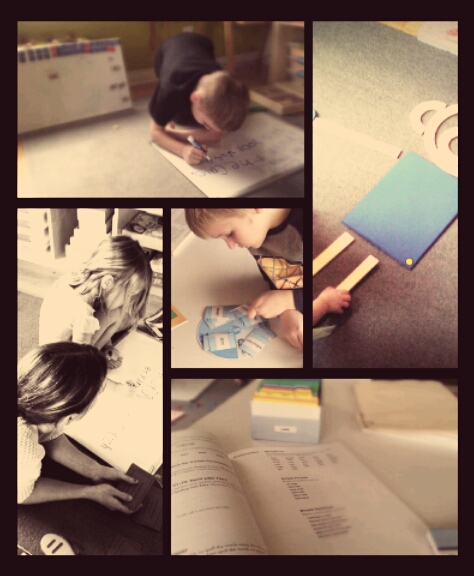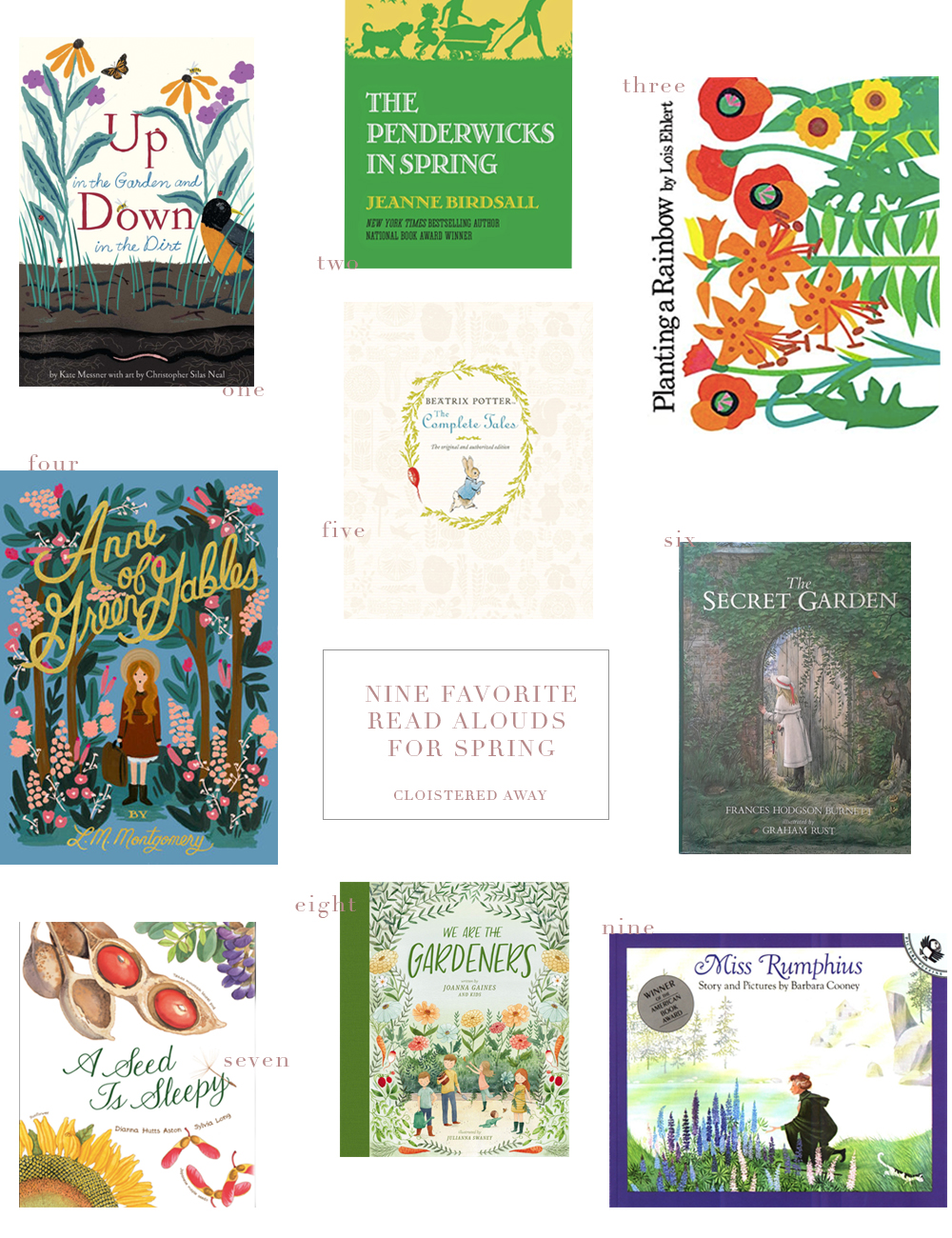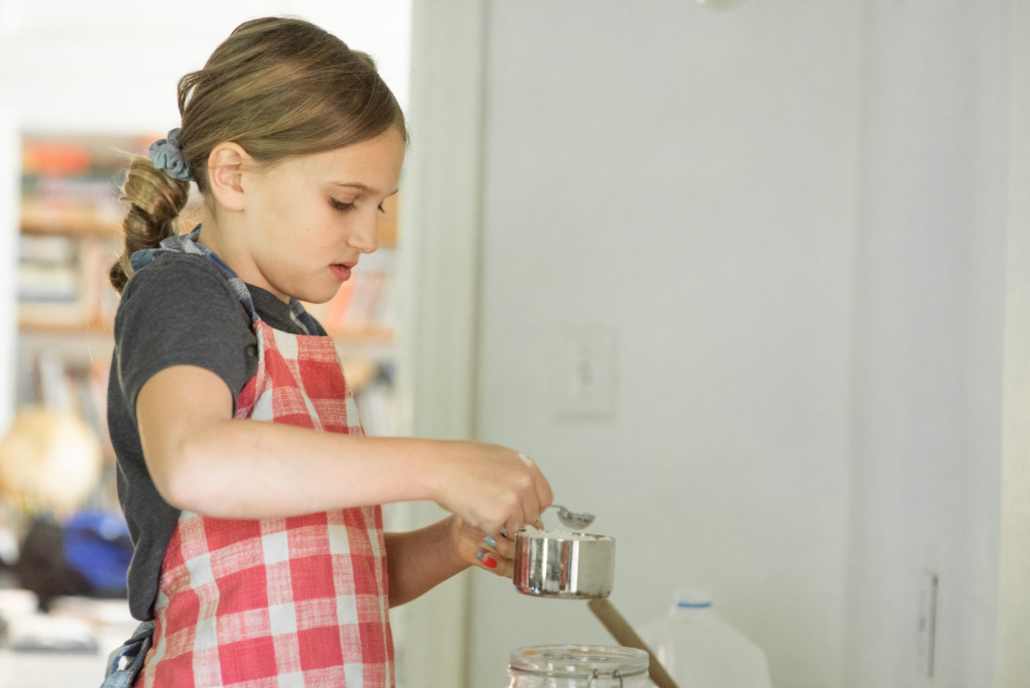
When friends who don’t homeschool first hear that I do, if they don’t immediately respond with the socialization question (which is merely a polite way of saying, “aren’t you afraid your kids are going to be weird/not fit in when they’re older?”), then they usually respond something like, “Wow, I could never do that; you’re so much [braver, more patient, more creative, etc] than I am.” Although the latter comments do boost my ego, I figured it’s time for me to deflate the mythos they’re cultivating and tell the truth: I’m really not. I’ve written before how I unexpectedly stumbled into this uncharted world (uncharted for me anyway), but as with most things, the longer I do something, the more I realize how little I actually know about this something — a trend in my DIY parenting style for sure. But “homeschooling” really is such a deceiving term, leading most of us to believe it’s simply school work done at home. But that’s only a part. For our family, it’s better described as an extension of our parenting; thus, education becomes a broader word touching all parts of our lives and the ways the Lord speaks to us through them, whether it’s by spelling, gardening, Latin, learning how to clean up after ourselves, tie our shoes, or love others. And we are still in the wee stages of learning all these things.
Classical Conversations
“Sure, but what is it that you actually do everyday?” Much like our children, no two days look exactly the same (although at some point I will record one or two of our days to give an example), but there are some constants in all of our flexibility. I follow a classical model of education doused with inspiration from the Waldorf and Montessori approaches. For the last three years, we have met with a local Classical Conversations community once a week. There, our kids meet in classrooms of 8 kids with a tutor who introduces them to their memory work for the week, mostly through singing or a fun rhyme. The parents stay in the classrooms and participate with their kids and tutor, where we also learn new things much of the time (wink). CC really has been such a wonderful constant for our family; in addition to the kids’ weekly presentations in front of their classes, science experiments, and fine art projects, they are learning other practical skills like walking in a line and raising their hand when they need to share something with the larger group (things we don’t do at home). So part of our mornings at home or in the car, we review our CC memory work: facts in history, English grammar,math, Latin, geography, Bible passages, and a historical timeline.
How that Translates to OUR Home

Reading really is the backdrop of our home-school. We read everything from the comics to novels to biographies to picture books to news articles to history and science encyclopedias. We read aloud. We read silently, sometimes alone and other times side-by-side. We try to discuss some elements of at least one, usually brief, narrative each day (characters, setting, conflict/problem, climax, resolution, and something the story might be trying to teach us), which is actually much simpler than it sounds: “Who’s in the story?Where does it take place? What problem does this character(s) have? Is there a surprise in the story? A place where the story/character changes? How is the problemeventually resolved; is it resolved? What is this story saying to us? Is it trying to teach us something?” Even Olive can participate in this activity. And now that the boys are reading larger chapter books on their own, I try to have the same sort of discussion with them after they’ve finished. This way I can check their comprehension of the story, and they can practice narration skills and identifying the “skeleton” of a story (although they don’t yet recognize that’s what they’re doing). Plus, sharing in their enjoyment of a book just makes me giddy.
I structure very few “lessons” for the kids: only spelling, handwriting, and math, for the most part. It’s seems too stressful otherwise, especially with little Olive’s limited attention span and longing to create her own activity. We begin each morning all together (with my cup of coffee) reading the Bible, sharing what we’re thankful for on that morning, and of course, prayer. Because you know, I need it: prayer coupled with thanksgiving. Then we fill the rest of our day with poetry memorization, history and science readings (usually while building Legos or creating play-dough sculptures), spelling lessons, dress-up, reading & reading games, drawing or painting, math, plenty of outdoor play, hand/writing, eating, emailing, and eventually having to clean it all up again. It feels about like that, only louder and messier, as each of these things overlaps the other.
The “Prepared Environment”


I repurposed one of our bedrooms two years ago to design a “prepared environment,” as Maria Montessori refers to it, the place where each of the kids can initiate their own activities and learning, the place where we spend most of our mornings now.
Early Childhood Resources I Recommend
I could go on about the logistics of our day, but that may be as boring for you to read as it is to write. Besides, if you’re still reading, I’m quite impressed. I never have been one for monotony. But I did want to share a few of my favorite resources for teaching young children. Resources that are valuable for ALL families with young children, not just home-schoolers. (And just to clarify, I’m not receiving anything for suggesting these to you.)
Nurturing Competent Communicators (1 hour long audio by Andrew Pudewa)
Reading Comprehension from Seuss to Socrates (1 hour long audio by Adam Andrews)
Teaching the Classics (by Adam Andrews) A more expanded seminar than the audio above. He teaches you how to discuss literature with your kids, regardless of their age. If you’re at all intimidated about discussing literature, this is worth looking into, even for your own enjoyment and education!
Linguistic Development Through Poetry Memorization –(by Andrew Pudewa; these are the sample pages at the beginning of the book. To purchase or listen to sample audio, go here.)
Handwriting Without Tears (K-5) / Get Set For School (3-4 year olds) : I LOVE this program! It’s a multi-sensory approach to learning handwriting and early math skills. They have several demo videos on their website to help you use their products, too. The workbooks have plenty of repetition with pictures to color along the way; older levels include more copy-work and dictation.
All About Spelling Another multi-sensory approach, with tons of repetition; I LOVE it! She’s recently developed a complimentary reading program, but I haven’t tried it out. I’m sure it’s also wonderful.
Writing With Ease by Susan Wise Bauer Here she explains the value and know-how to building a confident young writer. If you are homeschooling, she has workbooks that compliment if you don’t feel comfortable selecting your own texts.
Teach Your Child to Read in 100 Easy Lessons There are several wonderful reading programs out there. My kids enjoyed this one the most and it had some of the least amount of preparation for me — that I can always get behind.
Take It To Your Seat Phonics Centers This book comes with pre-made folder games, you cut out and glue to a manilla folder. All the games are self-check. These games are very helpful when you have multiple little ones at the same time, plus they reinforce the skills their already learning through reading and spelling.
Montessori for Everyone A website full of beautiful, colorful printables in all sorts of subjects.
Teaching Montessori in the Home: Preschool Years (by Elizabeth Hainstock) She gives you some very practical, easy-to-follow ways to apply Montessori theory at home with little ones.
Thanks for reading, and if you have any questions (or comments), please feel free to leave them in the comments section! I




Comments
Pingback: Gardening Does Not Have To Be Boring For Children Any Longer | About Alta Monte Springs
Bethany, I’ll sound very emotional when I say this, but my eyes leaked a bit when I saw the “prepared environment” – partly because it has been so long since I’ve been in your home, partly because it’s beautiful, partly because of how sweet it is to window in to your daily life. I thought just yesterday, “I must call Bethany and tell her how much pleasure the Lord takes in this season of her process with Him, how accurately she’s representing Him.” There’s more, but let’s have a phone call. :)
Emotion welcome! As always, thank you for your kind words. And yes, a phone call is in order.
Good for you! It sounds very challenging and also fulfilling.
Yes, challenging and fulfilling indeed.
I have been meaning to order Cruz the book “Teach your child to read ..”
But I never knew exactly where to buy or what the title was. Just ordered it…thanks for the link.
As always, glad to help!